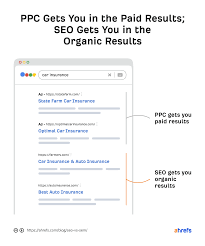In the world of digital marketing, SEO (Search Engine Optimization) and SEM (Search Engine Marketing) play crucial roles in enhancing a brand’s online visibility and driving traffic to its website. While both techniques focus on improving a website’s search engine rankings, they differ in their approaches and objectives.
SEO is the process of optimizing a website to improve its organic (unpaid) search engine rankings. This involves various strategies such as keyword research, on-page optimization, link building, and technical enhancements to make the website more search engine-friendly. The goal of SEO is to increase the website’s visibility in search engine results pages (SERPs) and attract more organic traffic.
On the other hand, SEM involves using paid advertising strategies to increase a website’s visibility in search engine results. This typically includes pay-per-click (PPC) campaigns, where advertisers bid on keywords related to their business to have their ads displayed at the top of search results. SEM allows businesses to target specific keywords and demographics, drive immediate traffic to their website, and achieve measurable results.
Both SEO and SEM are essential components of a successful digital marketing strategy. While SEO provides long-term benefits by improving organic rankings and increasing website authority, SEM offers immediate results through targeted paid advertising campaigns. By combining both techniques effectively, businesses can maximise their online presence, attract quality traffic, and ultimately drive conversions.
In conclusion, SEO and SEM are powerful tools in the digital marketer’s arsenal that work hand-in-hand to enhance a brand’s online visibility and reach. Understanding the differences between these two techniques and leveraging them strategically can help businesses achieve their marketing goals and stay ahead in today’s competitive online landscape.
Top 5 Tips for Mastering SEO and SEM in Digital Marketing
SEO
SEO (Search Engine Optimization) is a fundamental aspect of digital marketing that focuses on optimizing a website to improve its organic search engine rankings. By implementing SEO strategies such as keyword research, content optimization, and link building, businesses can enhance their online visibility and attract more organic traffic. A well-executed SEO strategy not only helps websites rank higher in search engine results pages but also establishes credibility and authority within their industry. Effective SEO practices are essential for long-term success in digital marketing, as they drive sustainable organic traffic and contribute to a strong online presence.
SEO
Search Engine Optimization (SEO) is a fundamental aspect of digital marketing that focuses on enhancing a website’s organic visibility in search engine results. By implementing SEO best practices such as keyword research, on-page optimization, and link building, businesses can improve their website’s ranking on search engine results pages (SERPs) and attract more relevant traffic. SEO not only helps increase brand awareness and credibility but also drives long-term sustainable growth by establishing a strong online presence. Embracing SEO strategies is essential for businesses looking to boost their online visibility and reach their target audience effectively in the competitive digital landscape.
SEM
Search Engine Marketing (SEM) is a vital component of digital marketing that involves using paid advertising strategies to boost a website’s visibility in search engine results. By running targeted pay-per-click (PPC) campaigns and bidding on relevant keywords, businesses can drive immediate traffic to their website and increase their online presence. SEM allows companies to reach their target audience effectively, measure the performance of their ads, and achieve tangible results in a short period. When implemented strategically alongside SEO efforts, SEM can help businesses maximise their online reach and attract quality leads, ultimately leading to improved conversions and business growth.
SEM
Search Engine Marketing (SEM) is a valuable digital marketing strategy that involves using paid advertising to increase a website’s visibility in search engine results. By running targeted pay-per-click (PPC) campaigns, businesses can effectively reach their target audience, drive immediate traffic to their website, and achieve measurable results. SEM allows companies to bid on specific keywords related to their business and have their ads displayed prominently in search engine results pages, ensuring increased visibility and potential customer engagement. When implemented strategically, SEM can complement SEO efforts and help businesses enhance their online presence and reach a wider audience efficiently.
SEO & SEM
Understanding the distinction between SEO and SEM is crucial in digital marketing. While SEO focuses on improving organic search rankings through strategies like keyword optimization and link building, SEM involves paid advertising to boost visibility in search engine results. By mastering both SEO and SEM techniques, businesses can create a comprehensive digital marketing strategy that drives targeted traffic to their website and maximises online presence.

